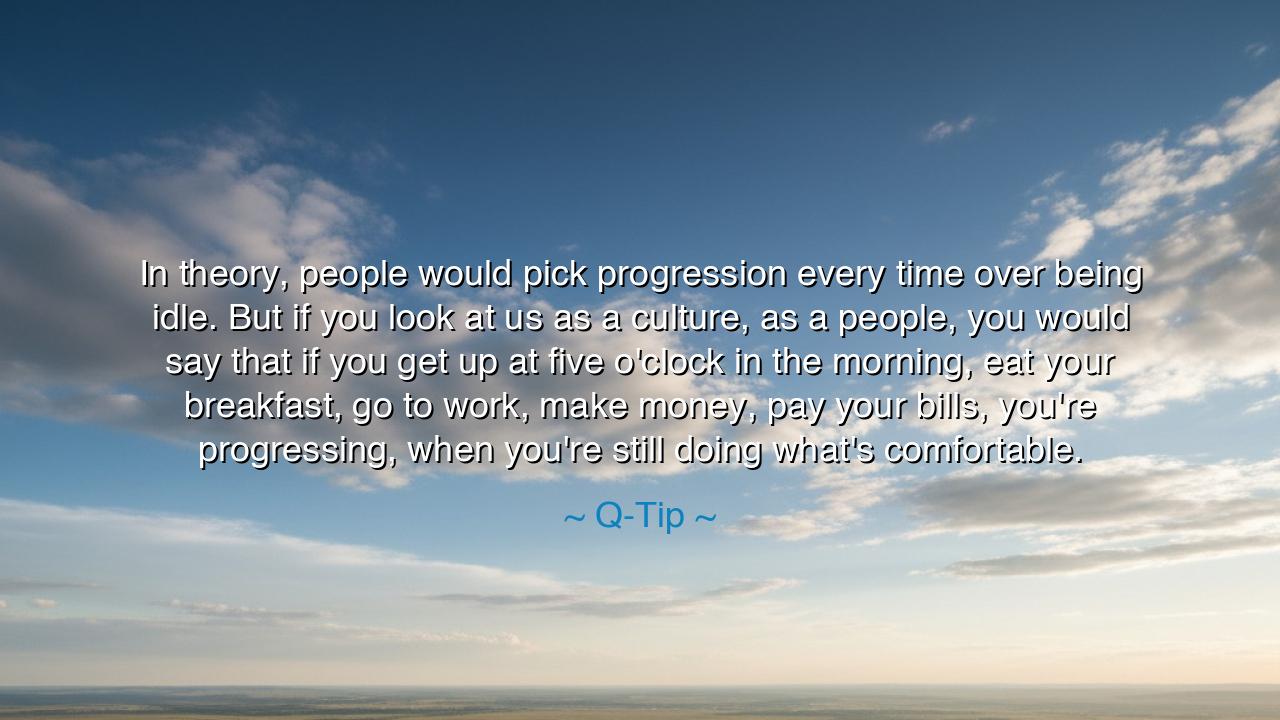
In theory, people would pick progression every time over being
In theory, people would pick progression every time over being idle. But if you look at us as a culture, as a people, you would say that if you get up at five o'clock in the morning, eat your breakfast, go to work, make money, pay your bills, you're progressing, when you're still doing what's comfortable.






“In theory, people would pick progression every time over being idle. But if you look at us as a culture, as a people, you would say that if you get up at five o’clock in the morning, eat your breakfast, go to work, make money, pay your bills, you’re progressing, when you’re still doing what’s comfortable.” So spoke Q-Tip, the poet of rhythm and wisdom, who saw through the illusions of modern life. His words strike not only at the heart of culture, but at the very soul of humanity’s understanding of growth. For what many call progression is, in truth, but the endless repetition of what is safe, familiar, and secure.
To wake at five, to eat, to work, to pay bills—these are the rituals of survival, the patterns that maintain life in its steady course. And yet, Q-Tip reminds us that such actions, though praised by society as virtuous, are not necessarily the path of true progression. For progress is not merely the continuation of habit, but the daring step into discomfort, the bold reaching for what lies beyond the known. To confuse comfort with progress is to mistake motion for direction, to mistake endurance for transformation.
The ancients knew this danger well. In the story of the Israelites wandering the desert, many longed to return to Egypt, for there they had food and shelter, though they were slaves. Their days were predictable, their lives stable, yet their spirits were chained. It was only in enduring the discomfort of the wilderness, only in facing hunger and fear, that they truly moved toward freedom. So too does Q-Tip’s saying reveal: the truest progression is found not in the comfortable, but in the path that unsettles and demands courage.
Consider also the story of Galileo Galilei. To many, the comfortable path would have been to repeat the teachings of Aristotle, to affirm that the earth stood still and the heavens revolved around it. That was the safe “five o’clock in the morning” routine of his age, the cultural bill-paying of intellectual life. But Galileo chose discomfort—he spoke of the earth in motion, of the sun at the center. For this, he was condemned, yet through his discomfort came the true progression of science. His courage shows that to rise beyond what is comfortable is the only way to change the destiny of humanity.
Q-Tip’s words also unveil a mirror to our own lives. How often do we measure ourselves by our schedules, by the money we earn, by the boxes we check? And yet, when we lie awake in silence, we feel the whisper of a deeper hunger—the hunger to grow, to risk, to create, to become something beyond the routine. We sense that while society applauds us for stability, our souls long for transformation. It is not in repeating yesterday, but in breaking into the unknown, that we become more than we were.
The meaning for us is urgent: comfort is not progress. Progress requires discomfort, risk, even fear. It is the artist daring to create a new form, the thinker daring to question old truths, the dreamer daring to step away from routine. To truly live is to embrace the unknown, to break free from the cycle of endless repetition disguised as advancement. For while bills and duties sustain the body, it is risk and vision that sustain the soul.
Therefore, children of tomorrow, let this be your practice: do not settle for what is comfortable, though the world may praise you for it. Rise not only to survive, but to grow. Ask yourself each day: am I repeating, or am I becoming? Take one step each morning into discomfort—learn what you do not know, speak what frightens you, attempt what seems beyond your grasp. For in that step lies the true meaning of progression, and in that discomfort lies the birth of greatness.
So remember Q-Tip’s wisdom: the world will call the routine “success,” but the spirit knows better. True progression begins where comfort ends. Choose not the path that is easy, but the path that transforms, and in so doing, you will rise beyond survival into destiny.






AAdministratorAdministrator
Welcome, honored guests. Please leave a comment, we will respond soon